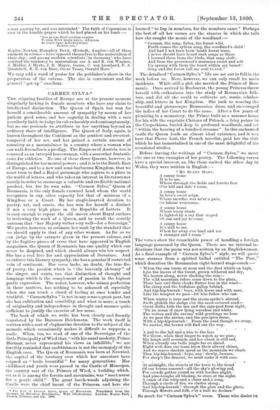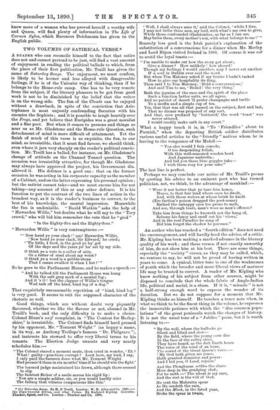CARMEN SYLVA.*
THE reigning families of Europe are at the present moment singularly lacking in female members who have any claim to intellectual distinction. The Queen of Spain has won for herself a considerable amount of sympathy by means of her patient good sense, and her sagacity in dealing with a race peculiarly liable to judge its rulers harshly and contemptuously; but no one pretends to attribute to her anything beyond an ordinary share of intelligence. The Queen of Italy, again, is known throughout the Continent as the gentlest and sweetest- tempered of her sex, and has gained a certain amount of notoriety as a mountaineer in a country where a woman who can walk five miles is a prodigy. The Empress of Austria, too, is renowed as an intrepid horsewoman, with a somewhat fantastic taste for athletics. No one of these three Queens, however, is distinguished for her mental powers ; and it is to the South-East of Europe, and to a new and semi-barbarous Kingdom, that we must turn to find a Royal personage who aspires to a place in the world of letters, and who takes an interest in literature not merely in order to encourage a valuable and creditable national product, but for its own sake. " Carmen Sylva," Queen of Roumania, is the only female crowned head whom the world recognises in any other capacity but that of mistress of a Kingdom or a Court. By her single-hearted devotion to poetry, art, and music, she has won for herself a distinct if not a very high place in the Republic of Letters. It is easy enough to repeat the old sneers about Royal authors in reviewing the work of a Queen, and to recall the courtly sarcasm that " her Majesty writes very well—for a Sovereign." We prefer, however, to estimate her work by the standard that we should apply to that of any other woman. As far as we can judge by the extracts given in the present volume, and by the fugitive pieces of verse that have appeared in English magazines, the Queen of Roumania has one quality which can never be despised, and which should always win her respect. She has a real love for and appreciation of literature. And to enforce this literary sympathy, she has a genuine if restricted vein of sentiment. Her verse lacks, no doubt, the true fire of poetry, the passion which is " the heavenly alchemy " of the singer, and wants, too, that distinction of thought and language which is the complement of passion in the highest poetic expression. The writer, however, who misses perfection in these matters, has nothing to be ashamed of, especially when she can touch a chord of feeling at once tender and truthful. " Carmen Sylva " is not in any sense a great poet, but she has cultivation and sensibility, and what is more, a touch of originality and independence in thought and manner quite sufficient to justify the exercise of her muse.
The book of which we write has been clearly and fluently translated by the Baroness Deichmann. The work itself is written with a sort of elephantine devotion to the subject of the memoir, which occasionally makes it difficult to suppress a smile. When, too, we read of one of the Sovereigns of the little Principality of Wied that, "with his usual modesty, Prince Herman never represented his views as infallible," we are forcibly reminded that snobbishness is not the monopoly of the English race. The Queen of Roumania was born at Neuwied, the capital of the territory over which her ancestors have reigned as " lords bountiful " for many generations. Her childhood and youth were passed in the Castle of Monrepos, the country seat of the Princes of Wied, a building which, set as it is among the forests and mountains, was " meet nurse for a poetic child." The great beech-woods adjoining the Castle were the chief haunt of the Princess, and here she
• The life of Carmen Sylva, Queen of Roumania. Translated from the German by Baroness Deiclimann, With Illustrations. London : Began Paul, Trench, Trnbner, and Co. 1890.
learned " to lisp in numbers, for the numbers came." Perhaps the best of all her verses are the stanzas in which she tells how she caught the music of the woodland :— " Carmen, the song, Sylva, the forest wild,
Forth comes the sylvan song, the woodland's child! And had I not been born 'neath forest trees, I never should have heard such songs as these. I learned them from the birds, that sang aloft ; And from the greenwood's murmurs sweet and soft Up sprang with them the heart within my breast ! Song and the forest lull my soul to rest."
The details of "Carmen Sylva's " life are set out in full in the work before us. Here, however, we can only recall its main incidents. While still a girl, she married the Prince of Rou- mania. Once arrived in Bucharest, the young Princess threw herself with enthusiasm into the study of Roumanian folk- lore, and did all she could to cultivate art, music, scholar- ship, and letters in her Kingdom. She took to wearing the beautiful and picturesque Roumanian dress, and encouraged the ladies of her Court to do the same. After a few years of picnicing in a monastery, the Prince built as a summer home
for his wife the exquisite Chateau of Pelesch, a fairy palace in the Carpathians, buried deep in profound woodlands, and set "within the hearing of a hundred streams." In this enchanted
castle the Queen leads an almost ideal existence, and it was here that Pierre Loti, the French novelist, paid her the visit which he has immortalised in one of the most delightful of his occasional studies.
Before leaving the writings of " Carmen Sylva," we must cite one or two examples of her poetry. The following verses have a special interest, as, like those recited the other day in Wales, they were written in English :—
" MY SUNNY HOME.
A sunny home It is to me, Where through the fields and forests free O'er hill and dale I roam.
A sunny home In love's sweet reign, Where sacrifice was ne'er a pain, Or labour wearisome.
A sunny home Where every shade Is lighted by a ray that stayed Of sun and joy to come.
A sunny home It's still to me, When far away o'er land and sea
A stranger sad I roam."
The verses show the remarkable power of handling a foreign language possessed by the Queen. There are no internal in- dications that the poem was not written by an Englishwoman. As a final example of " Carmen Sylva's " style, we will quote some stanzas from a spirited ballad entitled " The Post," which describes the Roumanian eight-horsed stage-coach :-
"When the sun burns at noon and the dust whirls on high, Like the leaves of the forest, grown withered and dry, We hasten along, never slacking the rein— The wild mountain riders come down to the plain, Their hair and their cloaks flutter free in the wind— The sheep and the buffaloes gallop behind,
And hip-hip-hurrah ? boys, with horse and with man, Like the tempest we pass—let him follow who can.
When winter is here and the storm-sprite's abroad, Swift glideth the sledge o'er the snow-covered road— Great drifts hide the inn and the sign-post from sight, 'Tis an ocean of snow lying waveless and white. The wolves and the ravens' wild greetings we hear As we pass the ravine, and the precipice drear, With a hip-hip-hurrah ! From the road though we stray, No matter, the horses will find out the way.
. . . . . . . ...
A jest to the lad and a kiss to the lass We throw, while they linger to watch as we pass ; His laugh still resounds and her cheek is still red, When already our bells jingle far on ahead. Right well does our team know their silvery chime, And we scarce slacken speed as the mountain we climb.
Then hip-hip-hurrah ! boys, nay ! slowly, beware, For steep's the descent, we must make it with care.
At midnight, the streets of the town to the tread Of our horses resound—all the sky's glowing red, For crowds gather round us with torches alight, And pine-boughs all blazing, to stare at the sight. A crack of the whip and a cheer and a song, Through a circle of fire, we clatter along; And hip-hip-hurrah ! through the glow and the glare, Through flowers and folk, e'er a halt we declare."
So much for "Carmen Sylva's" verse. Those who desire to know more of a woman who has proved herself a worthy wife and Queen, will find plenty of information in The Life of Carmen Sy/ea, which Baroness Deichmann has given to the English public.







































 Previous page
Previous page